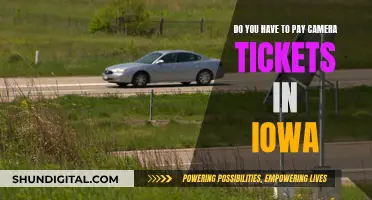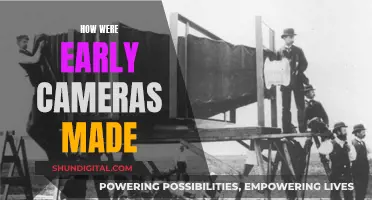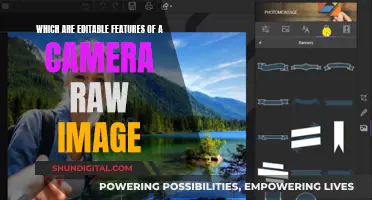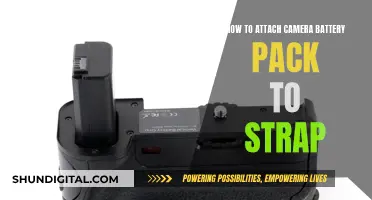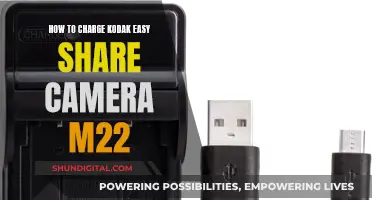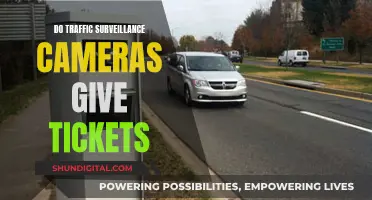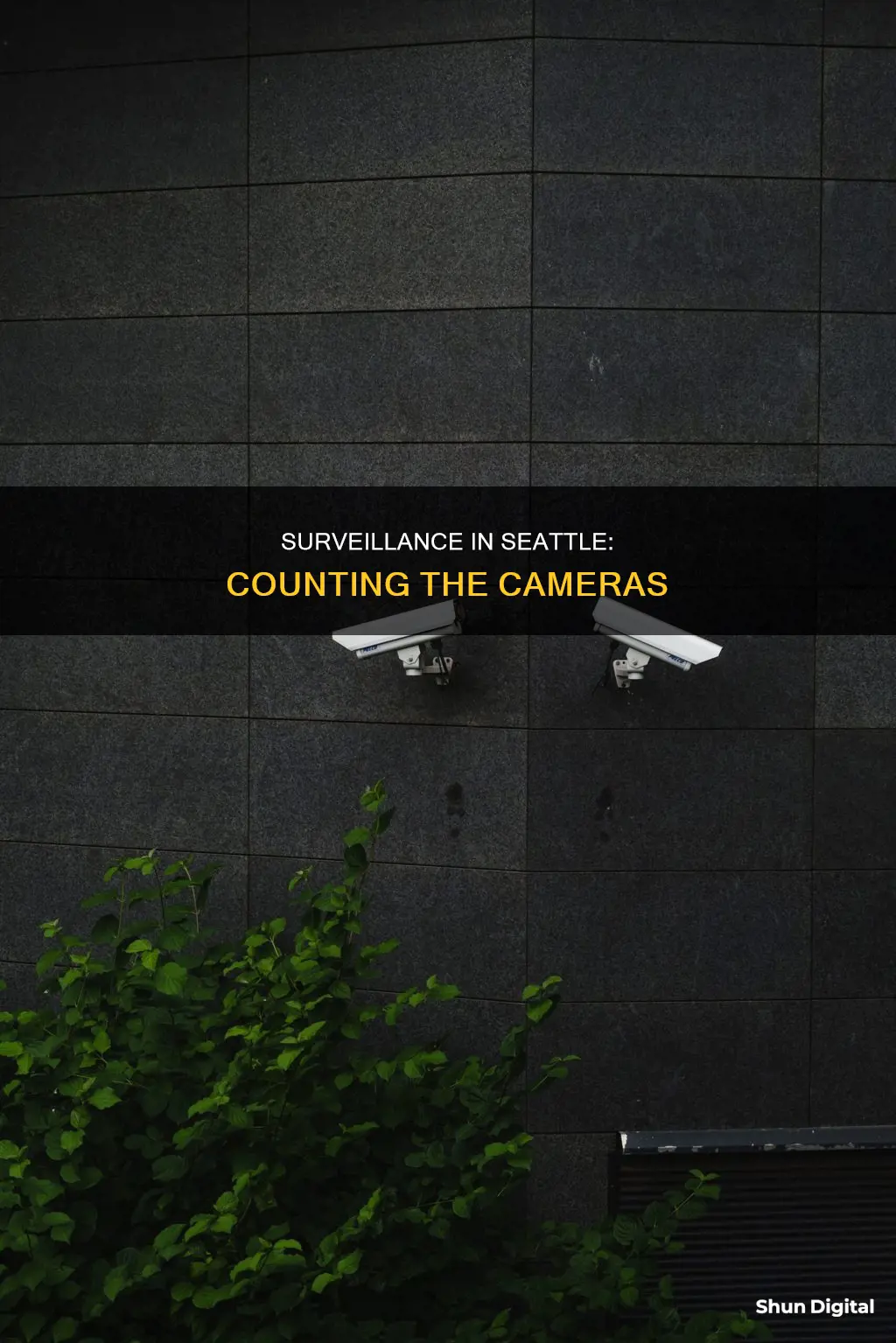
Seattle, Washington, has a range of surveillance cameras in operation, from traffic cameras to FBI-installed pole cameras. The number of surveillance cameras in Seattle is difficult to pinpoint, as there are various types of cameras serving different purposes, and some may be installed without the knowledge or permission of the city or its residents. One source mentions that the FBI installed nine cameras between 2011 and 2015, while other law enforcement agencies installed 20 during the same period. Additionally, an organization called Safe Cities Northwest aims to establish public-private surveillance networks in Seattle, similar to those in San Francisco, where semi-private Business Improvement Districts (BID) and Community Benefit Districts (CBD) fund large-scale camera networks that cover entire neighbourhoods.
| Characteristics | Values |
|---|---|
| Surveillance Camera Use | Traffic management, estimating travel times |
| Surveillance Camera Operator | SDOT's closed-circuit television traffic cameras and license plate readers |
| Surveillance Footage Retention | The City of Seattle does not archive or retain any of the images from the traffic cameras |
| Surveillance Footage Access | The City of Seattle reserves the right to suspend public access to the traffic camera images |
| Surveillance Camera Regulation | The Seattle City Council passed a surveillance ordinance requiring approval for the installation and use of surveillance equipment, as well as detailed protocols for data handling |
| Surveillance Camera Concerns | Potential for tracking individuals' movements, spying, and misuse by agencies |
| Surveillance Camera Entities | FBI, Safe Cities Northwest, SF Safe, San Francisco Police Department |
What You'll Learn
- The Seattle City Council is taking a closer look at how surveillance cameras will be used in the city
- The City of Seattle does not retain any images from traffic cameras
- The FBI has installed surveillance cameras in Seattle without the city's knowledge
- Safe Cities Northwest is aiming to create public-private surveillance networks in Seattle
- Seattle residents should ensure their police department seeks approval before accessing BID/CBD camera networks

The Seattle City Council is taking a closer look at how surveillance cameras will be used in the city
The American Civil Liberties Union (ACLU) has expressed their input on the ordinance, particularly regarding the potential for recording and the misuse of data by agencies like ICE. According to Shankar Narayan of the ACLU, safeguards are necessary to protect people's rights and faces. The council has also passed a surveillance ordinance requiring city departments to obtain approval for the installation and use of surveillance equipment, demonstrating their commitment to transparency and accountability.
In addition to the city's efforts, organizations like Safe Cities Northwest aim to create public-private surveillance networks in Seattle and other cities. This has raised concerns among residents, especially in light of similar programs in San Francisco that have faced legal and ethical challenges. The introduction of these camera networks has significant implications for political activity and privacy, with the potential for misuse by law enforcement.
As Seattle continues to grapple with the issue of surveillance, it is clear that there is a delicate balance between public safety and individual privacy rights. The city's efforts to regulate the use of surveillance cameras and promote transparency are essential steps in ensuring that technology serves the public's interests without infringing on their rights.
Fight Camera Tickets: Know Your Rights, California!
You may want to see also

The City of Seattle does not retain any images from traffic cameras
Seattle has a large network of surveillance cameras, with a recent report finding that the city has 31 "red light" traffic safety cameras operating at 23 arterial intersections. These cameras are equipped with high-resolution capabilities, capturing still colour photos and broader video footage of vehicles and their license plates. While these cameras serve a traffic enforcement function, there are concerns about their potential for more widespread surveillance.
The City of Seattle has asserted that it does not archive or retain any images from traffic cameras. This statement is significant as it addresses privacy concerns related to the use of surveillance technology. However, it is important to note that the City also reserves the right to suspend public access to traffic camera images. This suggests that while the City may not routinely retain images, it has the authority to control access to the footage when needed.
The use of surveillance cameras in Seattle has been a topic of discussion for the City Council, with an ordinance, CB 119519, introduced to regulate the use of such technology. This ordinance relates to the implementation of surveillance technology, specifically addressing the use of closed-circuit television traffic cameras and license plate readers by the Seattle Department of Transportation (SDOT). The ordinance aims to ensure that these tools are used for their intended purpose of managing traffic and are not misused for tracking individuals or invading privacy.
The Seattle Police Department (SPD) also plays a role in reviewing footage from traffic safety cameras. Images and videos of potential violations are sent to the SPD, where trained officers review and authorise the issuance of citations. This process ensures that only legitimate violations result in penalties, providing some level of oversight and accountability in the system.
While the City of Seattle's statement about not retaining traffic camera images addresses privacy concerns, it is important to consider the broader context of surveillance in the city. Seattle has a significant number of surveillance cameras, and while their primary purpose may be traffic enforcement, there are valid worries about the potential for over-policing and the impact on civil liberties, especially in Communities of Color.
iPad2 Camera Auto-Focus: Yes or No?
You may want to see also

The FBI has installed surveillance cameras in Seattle without the city's knowledge
The number of surveillance cameras in Seattle is a growing concern for its residents. While the city council has been taking a closer look at how surveillance cameras will be used, the FBI's installation of cameras without the city's knowledge has sparked controversy.
In a recent development, it has come to light that the FBI has installed surveillance cameras in Seattle without the city's permission or knowledge. These cameras, housed in birdhouse-like "concealments" attached to utility poles, were first spotted in July 2015. While a state public-records request yielded limited information from Seattle City Light, the presence of these cameras was not widely known until the U.S. Department of Justice sued the city to prevent the release of additional details, including their locations.
The FBI argues that revealing the locations of these cameras would have a "devastating impact" on their investigations and could invade individuals' privacy if their neighbors or the public learned of their suspicion. However, the American Civil Liberties Union (ACLU) disagrees, stating that long-term covert surveillance requires a warrant. They emphasize that the FBI's actions are brazen and that surveillance should not be imposed on the public without their knowledge or regulation.
The Seattle City Council previously passed a surveillance ordinance requiring city departments to obtain council approval before installing surveillance equipment, but the FBI's actions highlight the need to strengthen this ordinance to include outside entities like the FBI. The council should also ensure that entire surveillance programs, and not just individual instances, require public approval.
The exact number of FBI-installed cameras in Seattle is unknown, but public information lists about nine cameras installed by the FBI and 20 by other law enforcement agencies between 2011 and 2015. The FBI's use of these cameras and the potential invasion of privacy have sparked debates about the need for regulation and transparency in the use of surveillance technology.
Ohio Camera Speeding Tickets: Do You Have to Pay?
You may want to see also

Safe Cities Northwest is aiming to create public-private surveillance networks in Seattle
In San Francisco, at least six special assessment districts have installed these camera networks, with the largest belonging to the Union Square BID. The camera networks now cover a handful of neighbourhoods and 135 blocks. However, this model has been at the centre of a civil rights lawsuit against the city of San Francisco, and there are concerns about the potential for overreach and invasion of privacy.
In Seattle, surveillance cameras are already prevalent, with cameras located in city parks, police interrogation rooms, libraries, and Amazon Go stores. The city also employs the use of automated license plate readers, with at least 99 stationary readers deployed and 19 vehicles with mounted readers.
The Seattle City Council is taking a closer look at how surveillance cameras will be used in the city. A bill, CB 119519, relates to surveillance technology implementation and the use of SDOT's closed-circuit television traffic cameras and license plate readers. While these cameras are primarily used to manage traffic and estimate travel times, some residents are concerned about the potential for their movements to be tracked. The ordinance seeks to regulate usage and ensure proper training for operators.
The introduction of public-private camera networks in Seattle raises questions about the balance between public safety and individual privacy. While these networks may be touted as a tool to fight crime, there are legitimate concerns about the potential for overreach and invasion of privacy, especially when it comes to monitoring public events and protests.
Mastering Camera Raw Filter: Multiple Layers, One Easy Step
You may want to see also

Seattle residents should ensure their police department seeks approval before accessing BID/CBD camera networks
An organization called Safe Cities Northwest is aiming to create public-private surveillance networks in Seattle, Washington. The organization claims it is building on a "successful model for public safety" from San Francisco. However, this model has been at the center of a civil rights lawsuit against the city of San Francisco, been used to spy on Black-led protests against police violence, and is now facing resistance from a neighborhood hoping to prevent the spread of the surveillance program.
In San Francisco, the organization SF Safe connects semi-private Business Improvement Districts (BID) and Community Benefit Districts (CBD) with the police by funding large-scale camera networks that blanket entire neighborhoods. While they are run by non-city organizations, they are funded with public money and carry out public services. These camera networks are managed by staff within the neighborhood and streamed to a local control room, but footage can be shared with other entities, including individuals and law enforcement, with little oversight.
In October 2020, the Electronic Frontier Foundation (EFF) and the ACLU of Northern California sued San Francisco after emails between the San Francisco Police Department and the Union Square BID revealed that police were granted live access to over 400 cameras and hours of footage to monitor Black Lives Matter protests in June 2020. By doing so, the SFPD violated San Francisco's Surveillance Technology Ordinance, which prohibits city agencies from acquiring, borrowing, or using surveillance technology without prior approval from the city's Board of Supervisors.
Seeing how police have requested live access to camera networks to surveil public events, residents of San Francisco's Castro neighborhood, the city's historically LGBTQ+ area, have contested plans to install a camera network.
Given these concerns, Seattle residents should ensure their police department seeks approval and holds public meetings before accessing BID/CBD camera networks. The introduction of public-private camera networks threatens the political activity of grassroots activists, organizers, and demonstrators by opening them up to more surveillance and potential retribution. While businesses will likely join these camera networks to fight crime, once consolidated, this system of hundreds of cameras will be too tempting for police to ignore, as occurred in San Francisco.
Cedar Rapids Camera Tickets: What's the Cost?
You may want to see also
Frequently asked questions
It is unclear exactly how many surveillance cameras there are in Seattle. The FBI has installed at least nine cameras in the city, and other law enforcement agencies have installed 20 more. In addition, an organization called Safe Cities Northwest is aiming to create public-private surveillance networks in Seattle.
There are concerns that the surveillance cameras could be used to track people's movements and spy on them. There are also concerns that the cameras could be used by agencies like ICE to crack down on certain groups.
The Seattle City Council has passed a surveillance ordinance requiring city departments to obtain council approval before installing or using surveillance equipment and to provide detailed protocols for its operation and data handling. The ordinance also ensures that everyone operating the cameras receives adequate training.
Yes, the city of Seattle also uses drone technology and the Department of Homeland Security to monitor public safety.


